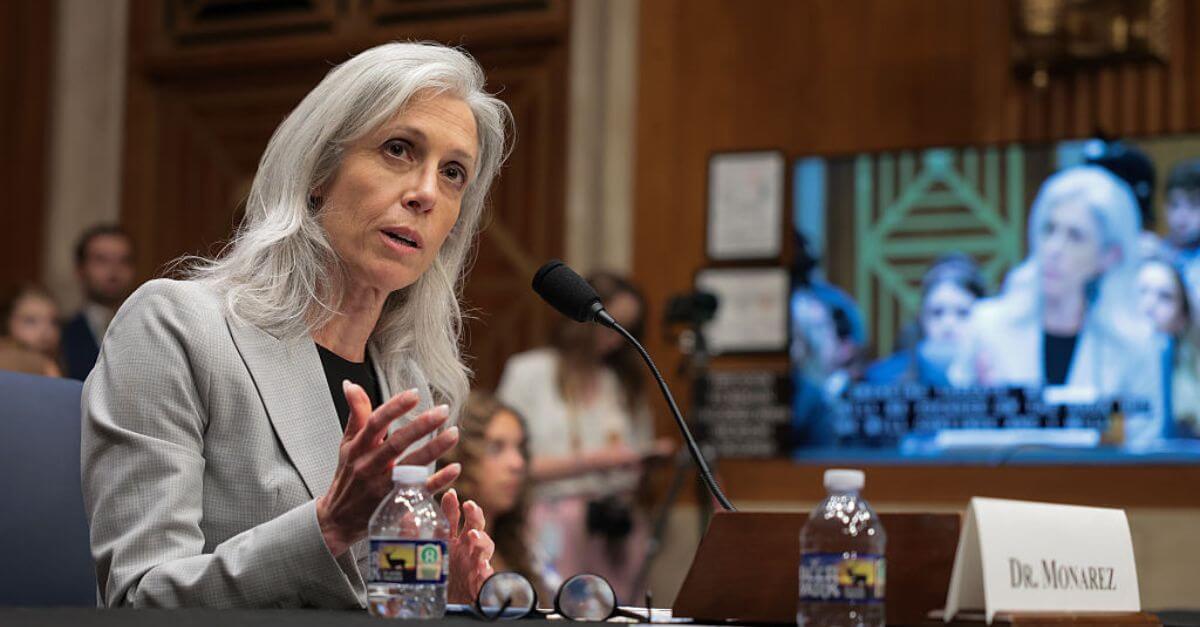CDC chaos leaves Orthodox Jewish communities more vulnerable to vaccine misinformation
Measles outbreaks have repeatedly affected Orthodox Jewish neighborhoods

Dr. Susan Monarez testifies during her Senate confirmation hearing in June 2025. Photo by Kayla Bartkowski/Getty Images
Under the Trump administration, Robert F. Kennedy Jr. has remade the nation’s vaccine policy — replacing all 17 members of a vaccine advisory committee, slashing research funds, and forcing the Food and Drug Administration’s top vaccine official to resign. On Wednesday, the White House’s purge of vaccination experts escalated with an attempt to fire the Centers for Disease Control and Prevention director, Susan Monarez.
Orthodox Jewish communities are disproportionately impacted by vaccine preventable diseases, with New York’s Haredi neighborhoods hit hard by a mumps outbreak in 2009 and measles outbreaks in 2013 and 2019. Public health experts say the firing continues a troubling trend of undermining scientific expertise, complicating outreach to religious and other at-risk communities, which leaves them more susceptible to misinformation.
“What’s been happening with CDC has been a process. That hemorrhaging of expertise, that reduction in force, and now, of course, what’s happening with the director, it’s tragic,” said Dr. Benjamin Kasstan-Dabush, a medical anthropologist at the London School of Hygiene & Tropical Medicine, who has researched Orthodox Jewish communities’ relationship to vaccination. “For anybody who works in public health, it’s just a nightmare.”
Local health departments often handle community outreach, but they rely on guidance from the CDC, Kasstan-Dabush said. Conflicting guidance can create an information vacuum where misinformation flourishes, he said.
Rabbi Dr. Aaron Glatt, chief of infectious diseases at Mount Sinai South Nassau, has been a public voice combating vaccine misinformation in the Jewish community, offering both halachic and medical advice. In recent years, he said, it has become more challenging to help people understand “what’s real and what’s not.”
“It would be a shame if we didn’t have the ability to have the CDC, and to have other governmental or quasi-governmental organizations provide us with guidance that was clear, unbiased and representing the best science has to offer,” Glatt said.
Blima Marcus, an oncology nurse featured in The New Yorker for her work combating vaccine misinformation among Orthodox Jewish women in 2019, said she no longer does vaccine outreach due to funding cuts.
“People cannot work for free; I can’t ask nurses and physicians to continue to show up in their free time, even if it’s important community health work,” she wrote in an email to the Forward, adding that “it’s a challenging time for public health, with the lack of funding and support.”
Glatt stressed that vaccine hesitancy is not a trend exclusive to Orthodox Jews, but outbreaks may be more visible in tight-knit Orthodox communities where viruses can quickly spread. Religious Jews often express many of the same concerns about vaccination as the general population, including questions about side effects, broader mistrust of mainstream medicine, or myths about the connection between vaccines and autism.
Still, effective outreach may include messaging tailored to Orthodox communities. Glatt emphasizes how vaccination “can fulfill the Torah’s commandment to keep yourself safe.” And many major Orthodox leaders encourage their communities to get vaccinated.
“I’m not aware of any poskim, the religious authority, that forbids you to get vaccinated,” Glatt said.
When communicating with people skeptical of vaccination, Glatt said the key is avoiding shame or disparagement. He says he earns trust by being clear about what’s known and what isn’t, rather than speaking with false certainty.
Kasstan-Dabush often explains to parents how vaccines have eradicated diseases and allow children to live long, healthy lives. Yet in today’s polarized climate, he said, getting that message across can be a challenge.
“We’re seeing lies about vaccination coming out from the highest political echelons of the White House,” he said. “My concern is how that misinformation might travel.”














